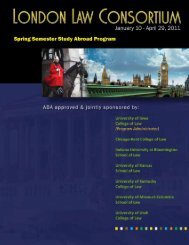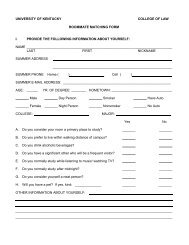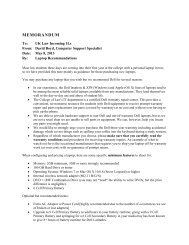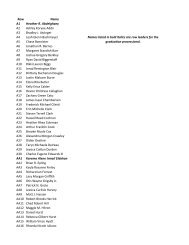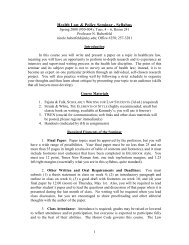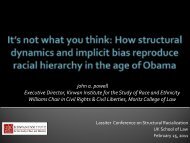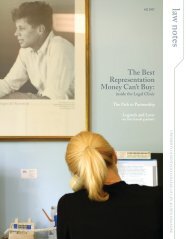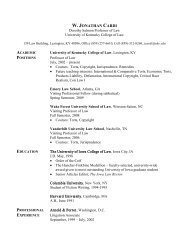law notes - University of Kentucky College of Law
law notes - University of Kentucky College of Law
law notes - University of Kentucky College of Law
Create successful ePaper yourself
Turn your PDF publications into a flip-book with our unique Google optimized e-Paper software.
A modest beginning<br />
A centennial anniversary celebration<br />
would be incomplete without a look<br />
back at the first several years <strong>of</strong> the<br />
UK <strong>College</strong> <strong>of</strong> <strong>Law</strong>. From a modest<br />
beginning, our institution has grown<br />
and adapted to meet the demands<br />
<strong>of</strong> a developing legal pr<strong>of</strong>ession.<br />
When the <strong>College</strong> <strong>of</strong> <strong>Law</strong> began<br />
its first classes in September 1908,<br />
it was housed in two rooms <strong>of</strong> the<br />
<strong>University</strong>’s Education Building.<br />
The course <strong>of</strong> study was, at that<br />
time, two years. The college had<br />
few students, few textbooks and<br />
few faculty members. The faculty<br />
consisted entirely <strong>of</strong> W.T. Lafferty,<br />
Charles Kerr and T.E. Moore, each <strong>of</strong><br />
whom had only limited experience<br />
teaching <strong>law</strong>. As Dean Lafferty later<br />
said, that first year ended “as well<br />
as might be expected.”<br />
The same faculty returned for the<br />
second year <strong>of</strong> classes. The course <strong>of</strong><br />
study had increased to three years,<br />
the library had increased to around<br />
300 books and enrollment had<br />
increased from 28 to 40 students.<br />
At this time, no post-secondary<br />
education was required to enroll in<br />
<strong>law</strong> school, the only requisite was a<br />
high school education.<br />
The <strong>College</strong> <strong>of</strong> <strong>Law</strong> continued to<br />
grow in its third year and added<br />
a new faculty member. Judge<br />
Lyman Chalkley, former dean <strong>of</strong><br />
the <strong>law</strong> schools at Transylvania<br />
and the <strong>University</strong> <strong>of</strong> the South,<br />
replaced T.E. Moore, who had<br />
resigned. Enrollment increased to<br />
sixty students. The library now had<br />
approximately 800 volumes and the<br />
<strong>College</strong> got a new home, an entire<br />
floor <strong>of</strong> the Science Building.<br />
By September 1913, the <strong>College</strong><br />
had an enrollment well over 100<br />
students and a library <strong>of</strong> around<br />
5,000 volumes. There were eight<br />
full-time faculty plus eight lecturers<br />
and two members <strong>of</strong> the <strong>University</strong><br />
faculty who gave lectures on<br />
general topics useful to <strong>law</strong>yers.<br />
During the summer <strong>of</strong> 1912, the UK<br />
<strong>College</strong> <strong>of</strong> <strong>Law</strong> had been admitted<br />
as a member <strong>of</strong> the Association <strong>of</strong><br />
American <strong>Law</strong> Schools.<br />
Like most <strong>of</strong> the nation, the<br />
<strong>College</strong> faced a difficult period<br />
a few years later during the First<br />
World War. At the beginning <strong>of</strong><br />
the 1918-1919 school year, 35<br />
students were enrolled and most<br />
<strong>of</strong> these were members <strong>of</strong> the<br />
Students Army Training Corps. The<br />
curriculum reflected the times, as<br />
classes were <strong>of</strong>fered in Military and<br />
International <strong>Law</strong>. Only two issues<br />
<strong>of</strong> the <strong>Kentucky</strong> <strong>Law</strong> Journal were<br />
published during the year. Faculty<br />
members had to assist with publication<br />
since there were not enough<br />
students to comprise an editorial<br />
board. The <strong>College</strong> suffered seven<br />
casualties during the war, including<br />
Pr<strong>of</strong>essor Reuben Hutchcraft (see<br />
sidebar). However, more prosperous<br />
times were to come, as more than<br />
30 students returned during the<br />
following spring semester. The<br />
<strong>College</strong> would again soon thrive. •<br />
by Dane Bowles<br />
Seven members <strong>of</strong><br />
the UK <strong>Law</strong> family<br />
lost their lives<br />
in World War I<br />
Pr<strong>of</strong>essor made ultimate sacrifice during WWI<br />
Reuben Brent Hutchcraft Jr. was<br />
born on December 15, 1886 in<br />
Paris, <strong>Kentucky</strong>. After receiving<br />
a bachelor’s degree in arts at<br />
<strong>Kentucky</strong> (Transylvania) <strong>University</strong><br />
he studied <strong>law</strong> at Harvard,<br />
graduating in 1910 and returning<br />
to Paris to practice <strong>law</strong>. While<br />
serving as a representative in the<br />
General Assembly <strong>of</strong> <strong>Kentucky</strong>,<br />
Hutchcraft was asked to join as<br />
pr<strong>of</strong>essor in the <strong>Law</strong> Department.<br />
In the March 1919 <strong>Kentucky</strong><br />
<strong>Law</strong> Journal, UK <strong>Law</strong> Pr<strong>of</strong>essor<br />
Lyman Chalkey wrote <strong>of</strong> Hutchcraft,<br />
“When the call came to his<br />
people to send their young men<br />
to arms in defense <strong>of</strong> their soil,<br />
their traditions, their faith, their<br />
liberty and their posterity… he<br />
answered eagerly as the highest<br />
opportunity that could come to<br />
him to serve.” Captain Hutchcraft<br />
received the Distinguished<br />
Service medal after his death for<br />
extraordinary heroism. Under his<br />
leadership, his platoon reached<br />
the most advanced position by<br />
any United Stated troops during<br />
the engagement. Within 30<br />
yards <strong>of</strong> enemy guns, Captain<br />
Hutchcraft was killed near<br />
Sedan, France on November<br />
7, 1918, four days before the<br />
armistice was signed. •<br />
• Robert E. Cullen<br />
• Chester B. Helm<br />
• Reuben Hutchcraft<br />
• Dexter W. Ramsey<br />
• Joseph C. Reynolds<br />
• Raymond Schoberth<br />
• Stanley H. Smith<br />
celebrating 100 years <strong>of</strong> excellence • Fall 2008 9



